Eco-Activist Grows His Own Toilet Paper — On Toilet Paper Plants: 'It's Possible'
"Everyone can have their own supply of TP growing freely and abundantly," Rob Greenfield, who says toilet paper plants save money and the environment, tells PEOPLE
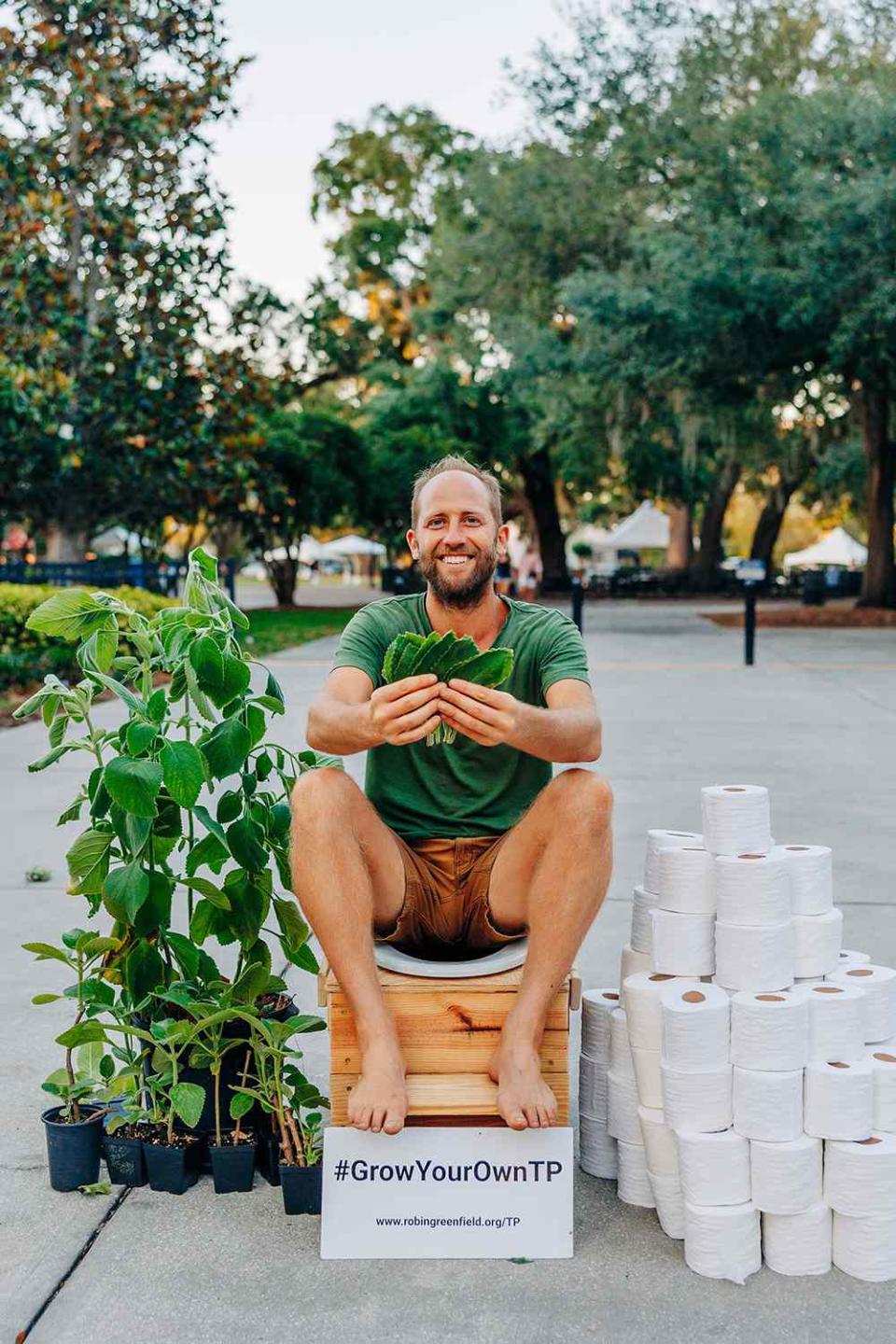
Rob Greenfield doesn't stock his bathroom with store-bought toilet paper. Instead, the noted environmentalist picks a few lush, green leaves from the blue spur flower plant growing in his yard in Florida and uses that instead.
Yes, really.
Since April 29, the eco-activist has been touring major cities in Florida as part of his Grow Your Own Toilet Paper Initiative to encourage people to use leaves from toilet paper trees instead of buying commercial toilet paper.
He picks a well-traveled spot in each city, sets up his compost toilet next to several packages of store-bought toilet paper and one of his green, leafy toilet paper plants, and lets the questions rip.
So why is he doing this?
"I want to show people that another way is possible," he tells PEOPLE. "We live in this consumer culture where most of us don't really know where things come from, how they get to us, and what the impact it is that it has on the earth. And toilet paper's no exception. We just buy it at the store and we never think twice about it."
For Greenfield, who likes to go to extremes when it comes to letting people know how our actions are threatening the planet, this campaign is just another way for him to bring attention to a pressing issue.
In the past few years, the 36-year-old Wisconsin native wore a plastic suit filled with all the garbage he used for a month, lived in a 100 square foot, solar-powered "tiny house" he built out of repurposed material, and ate food he grew and foraged himself to show people that living sustainably is doable. (This reporter tucked into a tiny, lemony-tasting green leaf — her first ever— that Greenfield foraged for her last fall at Yale University in New Haven.)
Related:Eco Activist Spent 30 Days Wearing His Trash – And By the End of the Month It Weighed 72 Lbs.
Now he's schlepping his portable compost toilet and one of his lush plants across Florida to get people talking.
"People on the streets see me sitting on the compost toilet, with these beautiful, vibrant plants, and I say, 'Hey, did you know that you can grow your own toilet paper?'" he says.
"It's really a way to catch people in the moment. They'll say, 'Whoa, you can do that? You can grow your own toilet paper?' And then I share with them that this is possible and that it's possible for us to grow so many things that can break us free from consumerism," he adds.
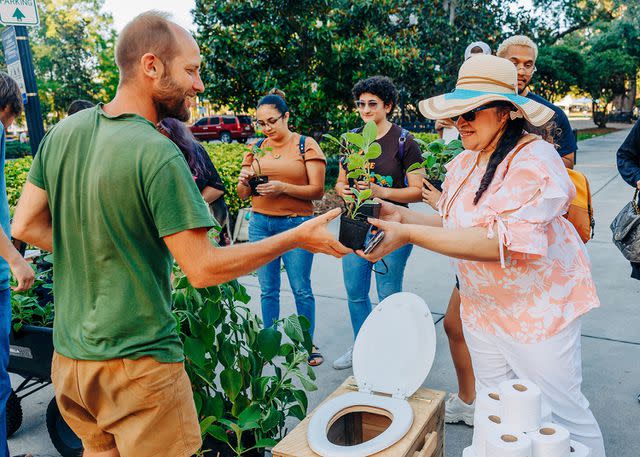
Once people start asking questions about the plant, Greenfield lets them touch the leaves.
"They're soft as can be," he says. "They're durable. I call them the Charmin of the garden."
They even smell like mint.
Plus, each leaf is the size of a piece of toilet paper and the plant provides a never-ending supply.
Related:Foraging is Easy - Plus it Saves Money and the Environment, Says Eco-Activist: 'Food is Everywhere!'
To make it easy to grow their own trees at home, Greenfield hands out cuttings of the toilet paper plant (Plectranthus barbatus/blue spur flower/boldo) for warm climates or mullein seeds so people who live in regions that experience freezes.
"Everyone can have their own supply of TP growing freely and abundantly," he says.
He should know.
"When I moved to Orlando, Florida in 2018, I planted two cuttings of the Toilet Paper Plant that a friend gave me and within one year I had a toilet paper plant abundant enough to support a family of five," he says.
He's never looked back.
"When people say things like, 'Oh, by wiping your butt with a toilet paper plant, you're going back to the past,' I'm like, 'No, I'm taking us into the future, a future that is actually living in harmony with the earth in a way we're connected to it. And in a way where we aren't dependent upon corporations to wipe our butts for us,'" he remarks.
RELATED VIDEO: This Eco Artist Turns Litter Into Landscape Paintings: 'We Can Be Better, More Sustainable Humans'
So why make the switch?
Using leaves from these plants instead of throwing paper - and money - down the toilet has plenty of benefits.
According to one U.S. study, the average household of 2.5 people uses 409 rolls of toilet paper a year. The average person uses 150 rolls a year, studies have shown.
"The average person spends two months of their working life just to pay for the toilet paper to wipe their butts," he says. "So we're talking about working a 40 hour work week for two whole months of your life just to pay for the paper to wipe your butt."
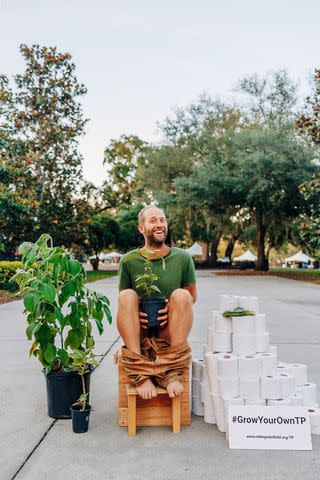
Although leaves from the toilet paper plant can't be flushed down the toilet, they can be thrown in the garbage — or buried in the yard.
Plus, cutting back on toilet paper reduces the amount of energy needed to cut down trees, manufacture the paper, distribute it and get rid of it, he says. They also help preserve old-growth forests, which are irreplaceable.
"To cut down those forests, to wipe our butt with the softest paper, to me, is just the ultimate disrespect," he says.
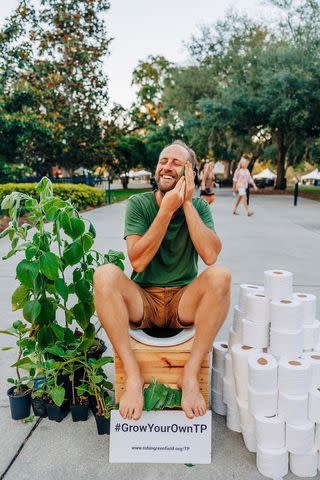
Getting people talking and thinking about how much toilet paper they waste is important, but it's also just the beginning.
"Ultimately, the truth of the matter is that growing your own toilet paper is a gateway to composting your own poop," he says.
Flushing toilets wastes trillions of gallons of fresh water and "all the chemicals that go into cleaning that water" are "causing an incredible amount of pollution," he says.
In Florida, "we have overflowing sewers because the sewer systems can't handle it. And our raw sewage is being dumped and spilled into our oceans consistently, all across the state," he explains. "So basically, if you're pooping in a flush toilet in Florida, there's a good chance you're pooping straight into the ocean, ultimately."
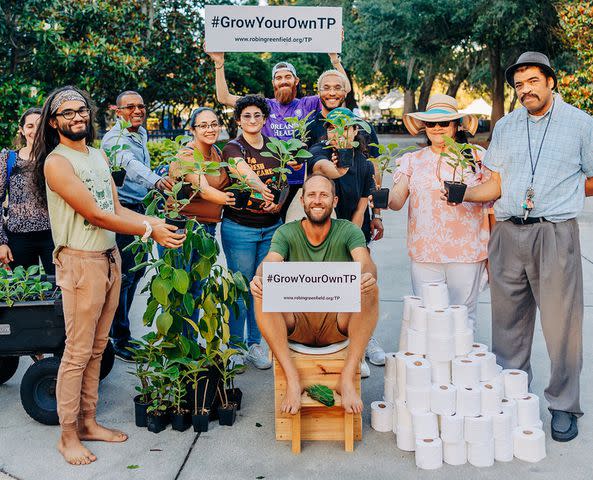
Composting poop can also help feed more people. "It would provide the nutrients we need to make organic compost to grow incredible amounts of food enough to easily take every human being out of food poverty or food insecurity, and be building our soil at the same time," he says.
Done the right way, composted poop is safe to use.
While composting poop, it heats up to as much as 160 degrees, a temperature that kills all the bacteria and pathogens that could make us sick. "But you still compost for one year because that amount of time also guarantees that anything would be dead in case your pile did not get hot enough," he says.
Ultimately, Greenfield says that "if we're talking about climate change, and we're talking about soil depletion, some of the absolute biggest issues of our time, composting our own poop is actually one of, in my opinion, the big true solutions to our environmental crisis."
Greenfield's Grow Your Own Toilet Paper Initiative will be making stops in Florida from May 4-Mary 9. Can't make it in person? Interested toilet paper plant growers can request plants or seeds in the mail, depending on the climate where they live.
For more People news, make sure to sign up for our newsletter!
Read the original article on People.

